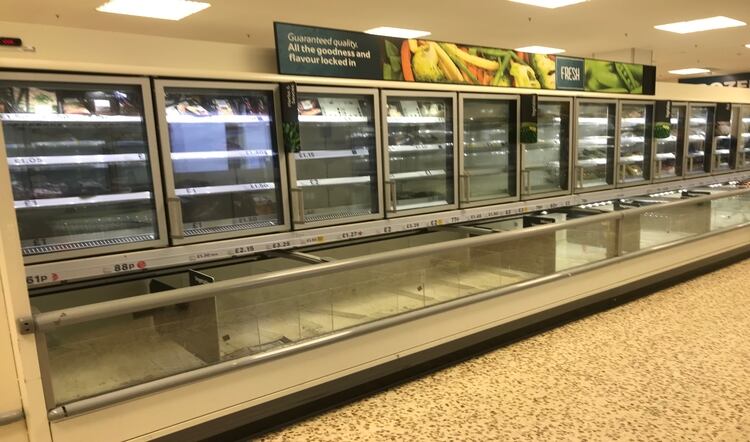Customers have been panic-buying and stockpiling on products such as long-life and frozen foods in the wake of the coronavirus (COVID-19) outbreak.
Many companies in the sector have already issued updates on the situation. Catering provider Compass Group has already seen an impact as it revealed a profits warning due to the “acceleration of containment measures” adopted by governments and clients in Continental Europe and North America. It said it expected the drop-through impact of the lost revenue to be between 25% and 30% across the business.
Irish food manufacturer Greencore, which is a major supplier to the UK convenience and supermarket channels, has reported that, from a demand perspective, group volumes are holding up well. But it said:“However, given the level of uncertainty, it is too early to predict the impact of COVID-19 on FY20 results”
Huegli UK said it had seen a “significant uplift” in demand from customers for its ambient, long-life, convenience products.
There have also been reported surges in people buying freezers to store frozen food items. Euronics, which supports 600+ independent electrical retail stores across the UK, said that March freezer sales had increased year-on-year by +300%, with refrigeration up +14% overall for the month.
“In the short term, the supply chain is trying to react to increased demand in stores,” said Richard Harris, chief executive of the British Frozen Food Federation.
“Most frozen food companies do actually keep stock and, typically, there will be three to four weeks of stock. This is about getting the stock out of the storage warehouses into depots and into stores. We are starting to gear up to get extra volume in.”
He said that its frozen food members were not reporting any particular challenges around staffing factories or plants, but this was being monitored.
“The only reason we have empty shelves at the moment is that people are bulk-buying. I am hearing from members that they are trading above Christmas levels, which is just crazy,” he said.
“We have a very efficient food supply chain and it is very slick.”
Meanwhile, Rodney Steel, chief executive of the British Contract Manufacturers and Packers Association, said that contract manufacturers would “do their best” to support brand-owners
“The contract manufacturing and co-packing industry is known for its flexibility and ability to adapt to challenges,” he said.
Strain on supply chain
Steve Duffitt, managing director of Pennine Food Ingredients, said that the panic-buying across all food sectors had escalated demand and strain throughout the food supply chain.
“All categories have been impacted, including the ones that have a steady sales rate throughout the year. It’s not just long-life products, but short shelf-life ones too,” he said.
Claire Summersby, partnership marketing manager at contract packing manufacturer Alexir Partnership, said: “There has been an increase in demand for certain packaging lines as customers are keeping up with the retailers’ requirements, no doubt precipitated by stockpiling. Currently, the situation is in hand and mitigation plans are in place should the need arise.”
Christopher Snelling, Freight Transport Association head of UK policy, agreed that the supply chain was coping with the increased demand despite trading being as “busy as Christmas”.
“We are thinking and preparing for the near future when large numbers of people start getting ill,” he said.
He added that conversations were ongoing about how to manage this demand and make sure that the industry was prepared.
“Even if we get to a more advanced stage, the goods can still move and will still be delivered to the shops,” he said.
There was also capacity that could be brought on-stream in terms of temporary workers, more deliveries per vehicle and also diverting drivers from other sectors such as clothing to food deliveries, he added.
The FTA has created a new portal, which can be found at www.fta.co.uk/coronavirus, which will provide visitors with an overview of essential information and advice for the industry. It will also include the latest information from the FTA’s Coronavirus Logistics Impact Survey, which will provide an ongoing snapshot of confidence across the sector and highlight particular industry concerns.
Panic-buying
In responding to the increased demand for home deliveries, supermarket Morrisons will create 3,500 new jobs with 2,500 pickers and drivers and around 1,000 people to work in the company’s distribution centres. These measures follow on from Morrisons' announcement last week that it would be implementing immediate payments for its smaller suppliers. It is also launching a new range of simple-to-order food parcels, including options for vegetarians, from 23 March. It will also launch a customer call centre for orders to be taken over the phone, so that people who do not shop online can still order food.
David Potts, chief executive of Morrisons, said: “We expect the days, weeks and months ahead to be very testing and we are determined to do our bit. These measures will support our very hard-working colleagues, enable us to provide more food to more people in their homes and create opportunities for people whose jobs are affected by the coronavirus.”
Wholesaler JJ Foodservice has seen a surge in trade as supermarket shelves were emptied with panic-buying. The increase in business created extensive queues and a five-fold increase in demand for some products
“Customer numbers more than doubled over the weekend as supermarket supplies ran dry, sending many shoppers our way,” said head of operations Sedat Kaan Hendekli.
“We are doing everything we can to fulfil orders while promoting the safety of our teams”




